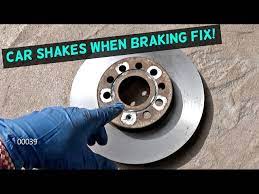If you’ve noticed the steering wheel shaking when you brake, this is a pretty straightforward sign that there’s an issue with your brakes. This problem can be attributed to several different issues.
Here are some of the most common reasons why your car may shake while braking:
- Worn or warped rotors
- Loose or damaged wheels
- Brake pad issues
1. Worn brake pads
Brakes will normally wear out over time. The more you drive, the more they wear down. You may have to replace them more often if you drive a lot or do a lot of stop-and-go driving in your car. One sign of worn brake pads is a squealing sound when you press the brake pedal. If this is happening, it’s time for new brake pads!
2. Worn rotors
If your car’s rotors look uneven, badly rusted, or when you touch them they feel like rough sandpaper, then it’s possible that the rotor is warped and needs to be replaced. Rotors can warp, crack or become uneven due to excessive heat. This can happen over time (especially if you drive an older car) but sometimes it can happen faster due to driving habits. Excessive braking can cause a rotor to get hot and eventually warp. If this happens while you are driving—the brake pedal feels too soft and you have to push it down further than normal—then pull off the road so that you don’t damage your brakes anymore.
The solution for worn rotors is usually just to replace the brake pads and rotors as part of a routine repair unless the brake calipers are also damaged as well. Otherwise you risk damaging new parts with old rotors that could possibly wear out much faster than expected because of their uneven surface.
3. Corroded or loose caliper
One of the most common reasons for car shaking when braking is a bad caliper. Brake calipers are responsible for pinching your brake pads onto the surface of your rotor. The problem with corroded or loose brake calipers is that they can’t hold their position when you apply the brakes and act just like your car’s wheel bearings: wiggling and causing your car to shake when braking.
Here are a few symptoms to look out for as you determine whether or not this is the culprit behind why your car shakes when braking:
- Brake pedal pulsating
- Brakes grinding
- The steering wheel is shaking while braking
The best way to fix these symptoms, especially if they prove to be due to a corroded or loose caliper, is by replacing them altogether. If you don’t feel comfortable doing this on your own, take it into a professional mechanic!
4. Out-of-true rotors
Depending on the cause, you’ll feel a slight vibration in the steering wheel when you brake. If this is the case, your vehicle has warped or out-of-true rotors.
A rotor is true when it sits parallel to its hub and has no high or low spots; it looks and functions like a perfect circle. But if your rotors are out of true, they will lose their circular form and begin to look more like an egg shape. This can happen after too many hot stops (like those days in traffic when brake heat boils over). When this occurs, your pads aren’t making contact with the entire surface of the rotor. Thus, each time you stop, your pads touch a new spot on the rotor…and that’s why you feel pedal pulsation!
5. Calipers are not centering themselves properly
If your caliper is not centered over the rotor, you should check for debris behind and around the brake pad. If there is nothing in the way, your caliper may be sticking. Try to unstick it by flexing the rubber boot with a screwdriver (the rubber boot protects piston from dirt) or by replacing it altogether. If you can’t get your caliper to center itself properly, you may need to replace your caliper slide pins or bushings. These components ensure that the brake pad remains centered on the rotor. Your local mechanic can help diagnose this issue and recommend solutions for any worn components.
6. Brake Hose Problems
If it’s your hoses that need replacing, you’ll be able to tell because the brake pedal will have a spongy feel. If you suspect this is the case, check for any evidence of leaking fluid. You may not notice this until there is a significant loss of fluid, so if everything looks normal then remove a wheel and take a look at the hose from that corner of the car. Any cracks or splits would mean that it needs replacing along with any other damaged components. It’s essential to replace all faulty parts immediately as failing hoses are dangerous and can cause complete brake failure.

